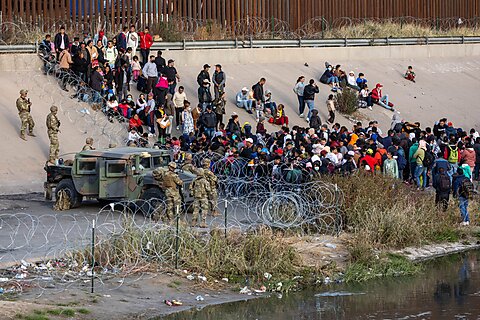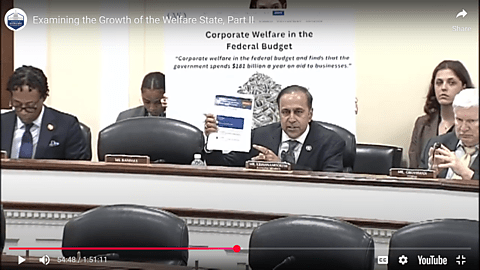
Donald Trump is likely to be elected president again in the 2024 election. His chances have risen precipitously over the last year for several reasons that economist and columnist Tyler Cowen outlines here. Cowen’s points are solid as a matter of purely positive analysis and he’s correct or at least partly correct about all of them, but crime and disorder should be included.
You can group Cowen’s reasons and my additions into four broad buckets. To be clear, these are merely theories that attempt to explain why Trump is favored to win, not my positions on the issues or whether the perceptions are justified.
One, the economic situation isn’t so rosy. Unemployment is low, but inflation, an elevated price level, high housing prices, and increased uncertainty are all destructive. Two, the Democrats overreached on some social issues involving race and transgenderism and they are (mostly rightly) blamed for many of the post-COVID-19 problems with schools. Three, the Democrats are bland and feeble, and the Republicans are much less so. Say what you will about Trump or J.D. Vance, they are far more entertaining and dynamic than President Joe Biden or Vice President Kamala Harris and personality matters more now that so much power is concentrated in the presidency.
Fourth, there is a real and perceived increase in chaos and disorder. The best examples of this are immigration and crime. The point of chaos and disorder is important and under-emphasized everywhere except by me (here, here, here, here, here, here, and here) and Republicans who combine the two most chaotic issues into one. As a result, the GOP convention speeches last night had the theme of Make America Safe Again.
A video played during the convention claimed, “The Biden [illegal immigrant] surge has also led to a surge in violent crimes committed by illegal migrants.” Senator Tom Cotton (AR) said that Biden “welcomed a third world invasion” and that “I asked them why they came. None said persecution and most said for a job.” The supposed violent intent of the illegal immigrants is implied by the word “invasion,” but a moment’s reflection is enough to realize that invading armies are not looking for jobs when they intrude.
Senator Ted Cruz (TX) talked about murders committed by illegal immigrants in recent years and said, “These aren’t just stories or statistics, they’re our daughters, our sisters, our friends. The families don’t care about the empty numbers. They care about the empty chairs at the dinner table, about the voices they’ll never hear again, about the laughter lost, and about the dreams that will never be fulfilled.” Michael Morin, whose sister was murdered by an illegal immigrant, spoke about the criminal who killed his sister in moving and personal terms.
The speakers’ stories of individual immigrants who have committed awful crimes were front and center. The victims deserve justice, and their loved ones and friends deserve our sympathy. However, it is a leap to go from highlighting the need to punish individual murderers to supporting punishing everybody who shares the same immigration status, as if they are all murderers—a form of collective guilt at odds with our civilizational values.
Individuals are responsible for their actions, not for the actions of others who look like them, sound like them, or share other opinions or immutable characteristics in common. This is also true for murder or attempted murder, regardless of the identity of the criminal. For instance, an illegal immigrant who alone commits murder is solely responsible for his crime. Other immigrants on the same visa, from the same country, or who are also illegal immigrants are not responsible.
However, there is another angle that should concern policymakers. If a certain group of people is more crime-prone than another, then the government should allocate additional law enforcement resources to reduce their crime. One of the government’s jobs is to protect life, liberty, and private property, and the government has scarce taxpayer resources that can be used for many different purposes. It should allocate those resources to efficiently minimize the amount and cost of crime.
The implication from the speakers at the Republican convention is that illegal immigrants are especially dangerous and crime-prone, intensive immigration enforcement would reduce crime, and mass deportations would reduce the crime rate. Those policies may prevent some individual crimes, but they will not reduce the overall crime rate and make America safer. A goal of Making America Safe Again requires prosecuting criminals who hurt people and not enforcing immigration laws in an indirect attempt to reduce overall crime rates.
The best data on illegal immigration and crime come from Texas, which is the only state that records criminal convictions and arrests by immigration status. Texas is also an ideal state to study immigrant criminality because it borders Mexico, has the second-largest illegal immigrant population of any state, is governed by Republicans, does not have sanctuary jurisdictions, has a reputation for strictly enforcing its criminal laws, and most border encounters of illegal crossers since 2020 occurred there. Homicide is the most serious crime and the homicide data are the most thoroughly recorded, so the following focus will be on homicide and comes from my recent policy analysis.
Between 2013 and 2022 the homicide conviction rate in Texas was 2.2 per 100,000 illegal immigrants, 1.2 per 100,000 legal immigrants, and 3.0 per 100,000 native-born Americans (Figure 1). Illegal immigrants were 26.2 percent less likely than native-born Americans to be convicted of homicide. Legal immigrants were 61.4 percent less likely than native-born Americans to be convicted of homicide. Focusing on 2022, homicide conviction rates for illegal immigrants and legal immigrants were 35.6 percent and 62.3 percent, respectively, below those of native-born Americans.
The relative homicide conviction rates between native-born Americans, illegal immigrants, and legal immigrants in Texas are similar to the estimated ratios in the nationwide illegal immigrant incarceration rate, which are also closer to all criminal convictions by immigration status in Texas although you should be skeptical when interpreting the last number. Police clearance rates are not lower in states with many illegal immigrants, so it’s unlikely that many illegal immigrants are also not committing crimes and escaping prosecution. Furthermore, the crime rates do not make any individual murder less heinous. However, the crime rates are what matter when the goal is to Make America Safe Again.
It’s reasonable to infer that illegal immigrant criminality is similar nationwide to what it is in Texas, but we don’t know for sure. All states should copy Texas’ method of recording the immigration statuses of criminals arrested and convicted, as I recommended here.
A second policy response is to expand legal immigration to reduce border chaos and disorder by channeling would-be illegal immigrants into the legal immigration system. This would shrink the pool of illegal border crossers, meaning Border Patrol could focus on excluding the few criminals and security threats that attempt to cross illegally. The effect would be to better dissuade foreign-born criminals and others from coming to the United States because they’d have a higher chance of being apprehended if crossing illegally and, if they entered legally, making sure they go through criminal checks.
Because legal immigrants have the lowest criminal conviction rates of all three categories in Figure 1, this would mechanically reduce overall immigrant criminality. Of course, the top policy response is to deport noncitizens who commit violent and property offenses in all cases, as mostly happens currently.
Chaos and disorder are the ignored causes of Donald Trump’s popularity among American voters—and those voters have good reasons to be upset by them. Immigration and crime are the most obvious examples of chaos and disorder during President Biden’s administration. Republicans and others are linking immigration and crime in ways that don’t match the facts. Still, it is an effective political strategy that could lead to changes in public policy that emphasize enforcement of our immigration licensing regime in a misguided attempt to reduce real crime indirectly. That strategy will not work and relies on a theory of collective guilt at odds with Western values.



